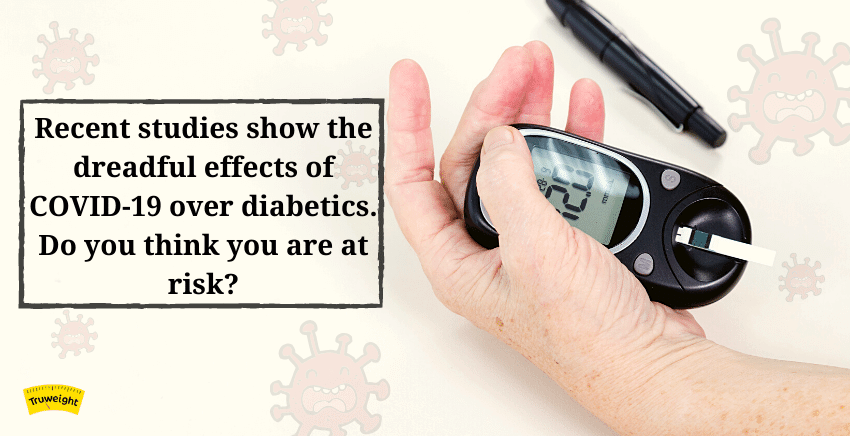Disease
Research On Effects Of COVID-19 Over People With Diabetes
Medically reviewed by Dr. Shunmukha Priya, Ph.D. in Food Science and Nutrition
The pandemic has already created a ruckus in each one of us and the daily news regarding the research on the new virus has created havoc in our minds. One such information lately that is catching up on each of our minds is the fact that the new virus is utmost dangerous to people with diabetes.
Introduction
One of the initial studies of COVID-19, that is meant to specifically analyse the effect of the virus on patients who are diabetic, states the disastrous news of all. One in ten patients who are diabetic will die within 7 days of hospitalization. One in five may be intubated and mechanically ventilated by this point.
Yes! This research is published in Diabetologia, by Professor Bertrand Cariou and Professor Samy Hadjadj, diabetologists at l’institut du thorax, University Hospital Nantes, INSERM, CNRS, and University of Nantes, France, and colleagues.
Some of the researchers also said that the majority of the COVID-19 patients that is nearly 90% of them had type 2 diabetes. While around 3% had type 1 diabetes, in the rest of the cases they had other types of diabetes.

This particular research, including those from the University of Nantes in France, analysed data from 1,317 COVID-19 patients admitted to 53 French hospitals between 10 and 31 March 2020.[1]
As a detailed insight towards the impact of this novel virus over diabetic patients let us look at the outcomes of some research and their analysis.
COVID-19 and Diabetes
As the research and its study signifies the effects of the new coronavirus over diabetic patients, we have gathered some of the leading information over the subject.
Here are the topmost important facts and their analysis:
Some studies on the COVID-19 patients acclaimed that patients with bad blood sugar control did not seem to impact directly on their outcome. But the risk of death was mostly for the patients with diabetic complications and for those who were in their old age.
In addition to being a risk for diabetics, the virus effects also seemed disastrous for patients with increased BMI. These patients were more in need of mechanical ventilation and also were in risk of death. This study noted the virus’s risks over people with obesity problems.
The research published in the journal Diabetologia reported that nearly two thirds of the patients with diabetes were infected with the virus were men. The average age of all these patients was 70 years.
During this study, the researchers also said that one in five of these patients had to be intubated by day 7 of hospitalization and also placed on a ventilator in concerted care. At this time, one in 10 had lost their lives; further about 18% had been discharged home. The researchers acclaimed that the micro-vascular complications in these patients doubled the risk of death at day seven.
As we have already read and heard of the fact that the patients, 65-74 years old, were three times more likely to die than those under 55 years. The scientists said that the presence of the respiratory conditions like obstructive sleep apnoea. And symptoms like shortness of breath almost tripled the risk of death within a week.

The scientists particularly wrote in the studies that elderly populations who have had diabetes since a long time and with advanced diabetic complications were at risk of early death. They might have to be given with specific management guidelines to avoid the infection with the novel virus.
Some studies also said that the number of deaths in patients under 65 years old, with type 1 diabetes were nil. However, the authors said there were only 39 patients with type 1 diabetes in the current study, adding that further research is needed to establish the effect of COVID-19 in this specific population.
With these contradicting researches over the impact of the virus on the patients with diabetes one clear factor for COVID-19 severity in the people living with diabetes was their higher BMI level. That being said, scientists stressed on the further researchers over the link between obesity and COVID-19.
The researchers have stated that patients with diabetes can continue their medications on insulin and other treatments for blood sugar; in no way they are a risk factor for severe forms of COVID-19.
It is true that people with diabetes have increased infection risk for influenza and pneumonia. Epidemiology studies have consistently pointed out diabetes to be one of the major comorbidities associated with COVID-19. It is definitely affecting the severity and risk for lives.
Most studies so far have shown a higher prevalence of diabetes in patients who are in ICUs than other less severe diseases. The mortality rate is also higher among patients with diabetes.[2]
Several health authorities and medical societies have listed out on COVID-19 patients with diabetes and have stated that people with diabetes are at higher risk of having severe illness from the novel virus.
However, studies and research on the virus is still in progress and the precise data regarding the impact of COVID-19 on diabetics are still lacking. Multiple institutions and companies are in progress detailing each and every fact about the virus.
CORONADO (Coronavirus SARS-CoV-2 and Diabetes Outcomes) is a nationwide multicentre observational study that aims to identify the clinical and biological features associated with disease severity and mortality risk in people with diabetes hospitalised for COVID-19.[3]
How can you get your diabetes condition into normal?
Weight loss has a huge impact on diabetes. We do not say that losing weight will cure type 2 diabetes in each of the cases; but getting a healthy body weight does have that sort of a potential for most of the people. Weight loss can also help people with diabetes to take less medications with time. It is sure to prevent the health problems that come with diabetes.
Reasons for developing type 2 diabetes are not completely clear with studies yet. But if one is overweight, that plays a huge role in developing diabetes.
Among people who are overweight, the body sometimes needs nearly 2 to 3 times more insulin than it would among people with healthy weight. That being said, people with diabetes need more insulin to be produced by the pancreas than its potential to produce.
When the pancreas is pushed beyond its capacity of producing insulin, the insulin-producing cells start to die. This worsens the situation as the pancreas now has even lesser cells to produce insulin.
With regard to this problem, the researches have acclaimed that the fat cells of people who are obese and who have more abdominal fat, release molecules that can be harmful to the pancreas. Hence, the risk of your pancreas being damaged is more when you have more abdominal fat.
Getting down to a lesser body weight reduces multiple health problems with beneficial health improvements. When your body weight is less, the pancreas produces enough insulin required by your body.

In some of the fortunate cases, weight loss is enough to restore blood sugar to a normal level. This can totally eliminate diabetes. Weight loss can also reduce the risk of other serious complications of diabetes, including heart problems, kidney disease and nerve damage.
Over time, each one of us are understanding the benefits of healthy weight and its impact on eliminating diabetes in us. Most people misunderstand diabetes to be a common disease with growing age.
But the fact is that the risk of diabetes raises over time only if you start gaining weight and that when you are less active physically as you age. For people who are fit and have maintained a healthy body weight has least risk of developing diabetes in them.
Family history is also one of the factors for having diabetes; for them maintaining weight is critical. Research has shown that people who have a family history of type 2 diabetes are more vulnerable to developing type 2 diabetes themselves. Staying at a healthy weight lowers their chances of getting the disease by about 70 to 90 percent.
Healthy weight is measured in terms of BMI (Body Mass Index) and that has to be 25 or lower. To achieve a healthy BMI, you need to run a marathon or spend hours working out in a gym. With the right diet and some physical activities, you can achieve your health back.
At Possible, we follow a diet based weight loss regime. We here let you explore different foods and instil in you the art of healthy living. Our program has helped thousands overcome diabetes and other health problems.[4]
What can you do at home to help cope with diabetes?
We here as a team care for the community and their health conditions. For individuals who are Pre-diabetes and for ones who have Diabetes. Here we are to educate you about how to manage diabetes during COVID-19. So that you can take that extra precaution to minimise the virus spread and also to boost your immunity at home.
Here are certain guidelines that include a list of foods that will help you improve your immunity; weekly diet plans and also some healthy recipes.
Conclusion
Now that the facts and truths about the impact of the new novel virus on people with diabetes are known and understood, it is clearly impossible to walk on the edge of the mountain knowing its depth.
The concerns are clear and so is the solution to it. Our responsibilities towards health cannot wait for a miracle, instead it requires an action. And the action today is to live healthy.
We at Possible pledge on getting our clients into healthy living. Our program not only circulates around weight management but also helping you grow out of diabetes, PCOS, Thyroid and many other health conditions.
Join us today and get better!
